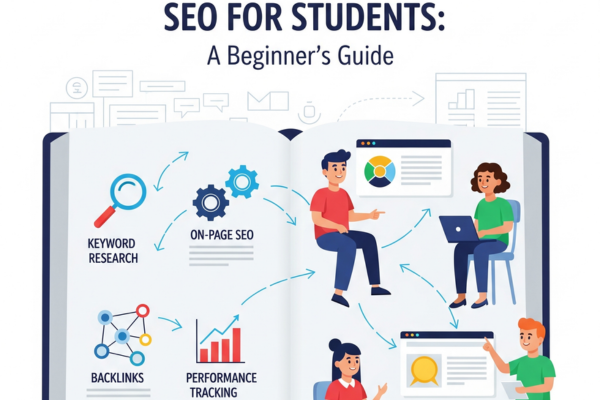Information is available everywhere in the digital age. Great, but how do you make sure your information is visible? Whether it’s an assignment, personal blog, or online resume, it can get lost in the myriad of information available online. Enter Search Engine Optimization (SEO). If you are a student, skills in the Guide to SEO for Students will not only be a techy skill to have in your arsenal, but also a superpower to aid in your coursework, establish your online presence, and even begin your career. Think of it as ensuring that your brilliant work is not shrouded with the vast offerings of the internet’s ocean.
What is SEO?
SEO is the process of increasing the quality and quantity of traffic to your website from organic search engine results. Simply put, it involves getting your website, blog, or other content to show up higher on search engines, such as Google, when someone searches for something that relates to your content. For example, if you’ve written an excellent research paper on “sustainable energy,” you will want that to show up when someone types in “sustainable energy.” SEO involves many processes, but the ultimate goal is making sure your content shows up on search engines when someone is looking for the same thing.
helps Google understand your paper is a great result, so it appears on the first page when someone types in “sustainable energy research.”
Keywords Are King:
Discovering What People Are Searching At the heart of any good SEO strategy is comprehending what words and phrases are being typed into search engines. These are referred to as “keywords.” Understanding Search Intent So before you choose your keywords, consider what someone’s intention to search is. Are they looking for information (informational intent), trying to buy something (commercial intent), or are they looking for a specific website (navigational intent)? Students tend to have indirect informational intent. Brainstorming Your Starting Keywords Start by thinking about your topic. If your paper is about “study tips,” you might brainstorm with “how to study effectively,” “study methods,” “time management students,” “study for exams Delhi.” This list of keywords will be your starting point for your Guide to SEO for Students.
Free Keyword Research Tools
You don’t need to spend money on software! Google Keyword Planner (you need a Google Ads account but you do not have to run ads), Ubersuggest, and even the Google’s People Also Ask section and the Related Searches at the end of the results page are great free ways to build out your keyword list for guide to SEO for students.
On-Page SEO Basics: How to Optimize Your Content
On-page SEO are all the things you can do on your website or content to help search engines understand it.
Compelling Titles and Meta Descriptions (guide to SEO for students)
Your title tag (the main header of your page) and the meta description (the short summary that appears under your title in search ) are important. You should have your main keyword in both your title tag and your meta description. Your title tag and meta description should be short and entice the user to click. For this blog I used a meta description like so: Unlock the power of SEO! The keywords are centered to drive our readers to read it.
Organize Your Content with Headings (H1, H2, H3)
Use headings (H1 for your main title, H2 for your major headings, H3 for your sub-headings) to structure your content. This helps your reader as well as search engines understand your content structure. Your main keyword should ideally appear in your H1.
Writing Interesting, Keyword-Filled Content
Write naturally but be intentional with your keyword selections throughout the content. Don’t be all “keyword stuffed!” This means to repeat as many keywords as you can regardless of coop hour flow. Aim for a reasonability of flow. Provide value! High-quality content will always reward you in the end.
A simple Guide to SEO for Students discusses on-page SEO, off-page seo, and technical SEO with appropriate illustrations to explain the concepts in plain language.
Images are More Than Pretty: Readability Improvements
Images not only make your content more appealing and break up lots of text to enhance readability but they also create additional SEO opportunities. Some basic tactics include naming images descriptively (i.e., seo-for-students-guide.jpg), compressing images to improve loading speed, and always using “alt text” (alternative text). Alt text tells the reader with visual impairment, as well as search engines, about the image.

Off-Page SEO Basics: Build your Trusted Authority
Off-page SEO is the action taken on other websites outside of your own website to influence your rankings.
Backlinks – back links, what are they anyway?
Backlinks are links from another website, to your website. Google treats these like a “vote of confidence” it is simple, the more quality relevant backlinks you have the more authoritative your content appears.
Link-Building Suggestions for Students
Even though a student may not have a huge network, you can certainly:
Share your content via social media platforms.
Write guest blogs for University blogs and student organization websites.
Or you could just create great content that people want to link to on their own.
Technical SEO Simplified: Allowing Search Engine Bots Read Your Website
Technical SEO is just how search engine can find your site, crawl it, and read your content.
Website speed is important. You want to give visitors a quick loading page. Just like no one wants to use a slow website, Google prefers a fast loading page. You can use tools such as Google PageSpeed Insights to find the speed of your page and to get recommendations to improve your speed.
Mobile-friendliness is important. These days, most of us browse on the phone instead of the laptop, your website or blog has to be “responsive”.

Beyond the basics: Local SEO for students
You may want to promote a local event or organize a study group for students in Delhi, then Local SEO is important. Local SEO is all about optimizing for searches that are local to you (generally through Google My Business). While Local SEO is intended for businesses, it’s useful to understand Local SEO for things like student initiatives (guide to SEO for students).
Content is king: Create valuable information
At the end of the day, the foundations of SEO is really finding a ‘value’ to the end user, and providing unique and useful content to your audience. It doesn’t matter whether it is in the form of a study guide, project reports, or even your own self-reflection, if you create something that actually assists or helps someone, search engines will recognize that. If you create content solely to attract traffic without actual value or substance – the search engines will ultimately replace you with a higher quality and lower cost source. I recommend looking at the most commonly asked questions related to your subject and focus on providing credible answers.
Tracking Your Progress: Basic Analytics for Beginners
How do you know if your SEO is working? Google Analytics and Google Search Console are free tools that tell you about your website traffic, keywords, and how people engage with your content. Develop a way of tracking your progress!
How to Use Your SEO Skills to Enhance Your Student Life
Think about submitting a digital project. If that project was successfully SEO optimized, your professors or classmates searching for information on that topic could potentially discover your project; maybe even see it’s still marked with a grade mark on a link next to the Subject and you are explaining it in your digital project and convince them on the merits of those SEO skills you are using on your student project. You can optimize your online portfolios, your research papers (if hosted online) that you have been developing for classes, and even your presentations. Practical Guide to SEO for Students and hopefully student-life!
SEO for Your Career: Surviving in the Job Market
In the competitive job market, knowledge about SEO is highly desirable. Whether you’re going into marketing, content, or even web development and programming it is beneficial. Use your knowledge of SEO to your advantage! Optimize your LinkedIn page, and personal website!
Typical SEO Mistakes Most Students Make (and How You Can Avoid Them).
Too Many Keywords: Write for content and not for keywords.
Ignoring Mobile: Not making websites for mobile devices.
Lifeless content: Writing for search engines not for human consumption.
Time: SEO takes time. Don’t think it’s going to happen overnight!
Keep Pace: SEO is Always Changing
SEO is changing. Google updates its search algorithm frequently, which means that SEO is changing. Stay on top of things, read reputable SEO blogs (like Moz, Search Engine Journal), attend webinars, and stay continually learning.
Quick SEO Tips
Consider user experience: What is a good experience for your users is a good experience for an SE.
Be on a consistent basis: Always be publishing and updating content.
Steal, like an artist: Take notes on the successful sites in your niche. See what they do.
Try things: Don’t be afraid to experiment.
By doing the tips gained from a Guide to SEO for Students, learners can build a practical grounding in online marketing
Conclusion:
The Path to Becoming an SEO Expert Begins Here
Becoming an SEO expert may seem intimidating, but you’ve already taken a step in the right direction by completing this Beginner’s Guide to SEO for Students. Start small, look to create quality, and be patient. The practices you develop will help you promote your independent work in an online world, and become a transferable skill in your academic career and professional future. Now go and optimize!
Frequently Asked Questions [FAQs]
Q. I’m only a beginner, do I really need to learn SEO? What is it going to help me with?
Ans: Definitely! Learning the foundations of SEO for beginners is a great skill for a student to have – it’s not just for marketers. Knowing the fundamentals of SEO will help you get your academic papers, digital portfolios or personal projects found online by a wider variety of audiences. SEO can also be a unique skill to have on your resume, demonstrating to potential employers that they can trust you to understand how to make digital content, visible and successful online. This Guide to SEO for Students is designed to get you started.
Q. Which is better, many short blog posts or a few long ones?
Ans: SEO tends to prioritize quality over quantity. It is best to have a few long, detailed, and high-quality blog posts (referred to as “pillar content”) that address the topic in great detail. Search engines, specifically Google, generally prefer detail that, in the best-case scenario, provides a complete answer to a user, instead of short, incomplete answers. One comprehensive, well-optimized post such as “Study Tips for Exams” that outlines all of the techniques is often more powerful than five separate, shorter blog posts.
Q. How long does it take to see results from my SEO work?
Ans: SEO takes time and patience. It is not instantaneous. You will generally see early results, such as indexed pages appearing in search results, within a few weeks. However, to track major improvement such as traffic or ranking in the search results, it may 3-6 months or a bit longer for topics that are extremely competitive. The consistent effort in writing quality content and building backlinks is what delivers results in the long-term.
Q. What is the most important first step in SEO for a student’s personal blog?Ans: The most important first step in SEO is to pay attention to keyword research. Before you write a single word down, you need to think about what your audience (fellow students, researchers, or people interested in your subject) is actually searching for. You can find the most common questions and phrases easily with free tools, such as Google’s “People Also Ask” feature or answerthepublic.com. This way you’ll be generating content that people are already searching for, and your Guide to SEO for Students efforts will be much more effective from the very beginning.
Q. Is there a big mistake that a student can make while trying to learn SEO?
Ans: The number one mistake is trying to “trick” search engines with old or bad tactics, often referred to as “black hat SEO.” An example of black hat SEO is keyword stuffing (repeating your keyword over and over again) or buying links. Not only can this get you penalized by Google, it also ruins the experience for readers. The best and most sustainable way, as mentioned above in this Guide to SEO for Students, is to focus on writing genuinely helpful content for genuine people. That’s the only thing that will be rewarded in the end.

